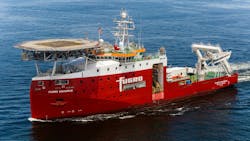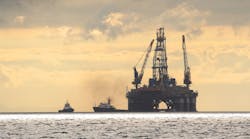Offshore Brazil round-up: Petrobras awards long-term vessel contracts for Fugro, DOF
Petrobras has awarded Fugro four multi-year contracts covering inspection and monitoring of subsea infrastructure offshore Brazil, with a combined value of around $340 million.
The four-year day rate deals, due to take effect in Q4, all carry options for one-year extensions. Each contract is assigned to a dedicated vessel, two to be operated by Fugro and two others by partner companies.
All the vessels will carry Fugro ROVs.
Three of the contracts, including one awarded to Fugro Aquarius, will replace existing contracts that are due to expire later this year, with improved terms and conditions. The fourth contract is new.
All will involve an expansion of Fugro’s remote operations capabilities, including remote piloting of ROVs, a technique first deployed offshore Brazil in 2023 from Fugro Aquarius.
The arrangement allows pilots to move to an office environment, also enabling real-time data analysis to support faster decisions, Fugro said.
DOF Group also announced contracts from Petrobras for two of its vessels with a combined value of more than $275 million.
Skandi Logger, an AHTS with 250t bollard pull, will start a four-year engagement next February, for which it will be reflagged to the Brazilian Flag.
And Skandi Achiever will work as an RSV for four years for Petrobras from December, in direct continuation of its current contract with another client in Brazil. Petrobras aims to deploy the vessel’s two work ROVs and subsea crane.
Brazilian offshore services provider Mitang has commissioned inertial navigation technologies specialist Exail to supply 30 Quadrans Attitude and Heading Reference Systems (AHRS) for installation on FPSOs operated by Petrobras offshore Brazil.
The Quadrans AHRS delivers real-time measurements of pitch, roll, and heading, with a claimed heading accuracy of 0.23° seclat RMS, for monitoring platform stability and ensuring uninterrupted operations during complex offshore activities.
That includes areas where GNSS coverage may be limited or intermittent.
Exal claims that the maintenance-free design ensures dependable performance in harsh offshore environments, supporting operational continuity. And the system’s fast start-up capability is said to support swift deployment and recovery following power cycles or system interruptions.
About the Author
Jeremy Beckman
Editor, Europe
Jeremy Beckman has been Editor Europe, Offshore since 1992. Prior to joining Offshore he was a freelance journalist for eight years, working for a variety of electronics, computing and scientific journals in the UK. He regularly writes news columns on trends and events both in the NW Europe offshore region and globally. He also writes features on developments and technology in exploration and production.


